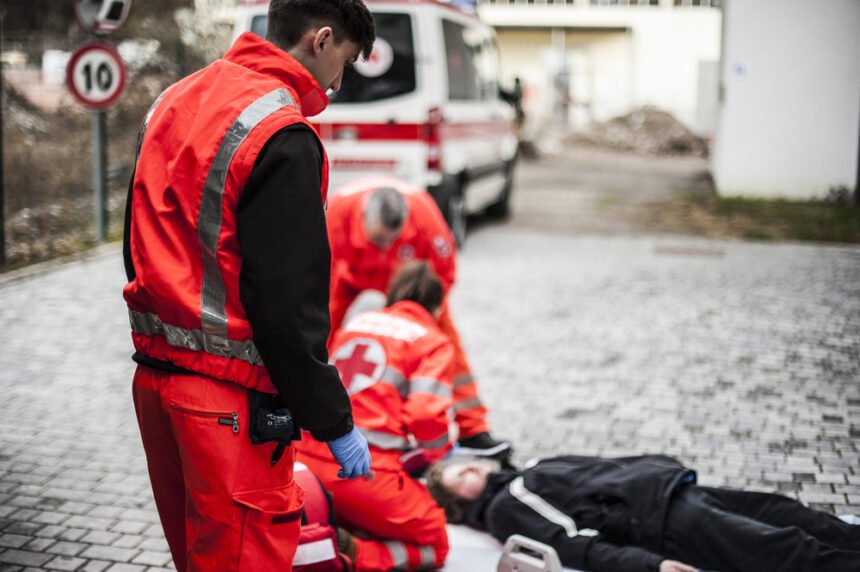A cardiac emergency, whether a heart attack or cardiac arrest, requires a swift response to save lives. Each year, 805,000 heart attacks occur across the United States, and 475,000 Americans die of cardiac arrest. With widespread implementation of a prompt, decisive response to cardiac emergencies, both medical professionals and ordinary citizens can help reduce these numbers.
How to Increase Survival Rates in Cases of Cardiac Emergency
Medical professionals should know the basics of CPR (cardiopulmonary resuscitation). Life support certifications for hospital staff are a crucial step towards saving lives. In a hospital setting, once the staff acquires their ACLS, PALS, and BLS certifications, cardiac arrest patient survival increases by 299%. But other individuals may also wish to learn the basics. You never know when you’ll be in a situation where someone’s life depends on it. Forty-five percent of individuals who experience cardiac arrest outside of a hospital survive if someone nearby can administer CPR.
To be able to save lives during cardiac emergencies, you should first recognize the signs. The signs of both a heart attack and a cardiac arrest are obvious enough for most people to identify them, especially if the patient can speak enough to share their symptoms with you. The symptoms also differ enough that most people should be able to identify which cardiac emergency is happening.
Signs of a Heart Attack
Signs of a heart attack may include:
- Chest pain, discomfort, or a sensation of compression and tightness
- Dizziness
- Nausea or vomiting
- Pain that radiates to the neck, jaw, back, arms, or shoulders
- Shortness of breath
It’s important to remember that signs of a heart attack may differ somewhat between men and women. Men suffer from heart attacks more often, so heart attack symptoms in women are sometimes overlooked. In particular, women often don’t experience chest pain, the trademark sign of a heart attack. Instead, women frequently report unusual, severe, and inexplicable fatigue, anxiety, and sleep disturbances.
Signs of a Cardiac Arrest
Signs of a cardiac arrest, or heart arrhythmia, include:
- Loss of consciousness
- Loss of pulse
- Weakness
- Chest pain
- Dizziness or fainting
- Shortness of breath
- Heart palpitations
Responding to Cardiac Arrest
If someone near you exhibits signs of a cardiac arrest, start administering CPR immediately.
Call the local emergency response number to get medical help as soon as possible.

If a defibrillator is available, use it, carefully following instructions. Defibrillators have been shown to be effective in 95% of cases of heart arrhythmia.
Responding to a Heart Attack
If you experience heart attack symptoms, dial your local emergency response number.
While you wait for medical help to arrive, chewing and swallowing an aspirin would help, unless you are allergic to it or your care provider has warned you against taking it.
If you have a prescription for it, take nitroglycerin. Otherwise, refrain from taking nitroglycerin as an incorrect dose can be dangerous.
If someone near you is exhibiting heart attack symptoms and is unconscious, dial the local emergency number. Start performing CPR at once.
Use an automatic external defibrillator (AED) if one is available.
Be Prepared
You never know when you might see someone near you experience a cardiac emergency; being prepared helps save lives.
Laymen can learn CPR basics. It takes comparatively little time and effort and can mean the difference between life and death. If you are a medical professional, look into ACLS, PALS, and BLS certifications.
Here is a basic overview of the three life support certification types:
- BLS (Basic Life Support): A BLS certification will help you acquire basic life-saving skills that will enable you to keep a patient alive under emergency conditions such as respiratory failure. The training program includes techniques such as chest compressions, AED use, and rescue breathing.
- ACLS (Advanced Cardiac Life Support): An ACLS program is more advanced than a BLS certification course, and teaches medical professionals what to do in cardiovascular emergencies, in particular cardiac arrest, stroke, and myocardial infarction.
- PALS (Pediatric Life Support): A PALS course teaches medical professionals who work primarily with infants or children.
Save Lives
Cardiac arrest causes more deaths annually than colorectal, breast, and prostate cancer, influenza, pneumonia, HIV, car accidents, firearms, and house fires put together. It is a leading cause of death in the United States, and every medical professional should know how to treat it in an emergency situation.
Acquiring and keeping up with your BLS, ACLS, or PALS certification could make the difference between saving and patients.
Remember, a medical professional who has dedicated their career to saving lives remains on duty even when they are not wearing their uniform. Having your life support certification may help you save the life of a friend, family member, or even a stranger in a situation of a cardiac emergency.








